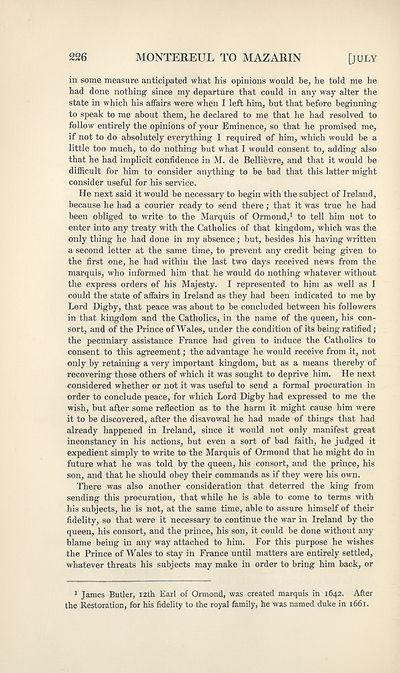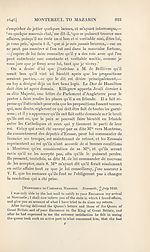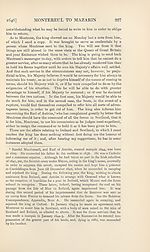Series 1 > Diplomatic correspondence of Jean de Montereul and the brothers de Bellièvre, French ambassadors in England and Scotland, 1645-48 > Volume 1
(263) Page 226
Download files
Complete book:
Individual page:
Thumbnail gallery: Grid view | List view

226
MONTEREUL TO MAZARIN
[JULY
in some measure anticipated what his opinions would be, he told me he
had done nothing since my departure that could in any way alter the
state in which his affairs were when I left him, but that before beginning
to speak to me about them, he declared to me that he had resolved to
follow entirely the opinions of your Eminence, so that he promised me,
if not to do absolutely everything I required of him, which would be a
little too much, to do nothing but what I would consent to, adding also
that he had implicit confidence in M. de Bellievre, and that it would be
difficult for him to consider anything to be bad that this latter might
consider useful for his service.
He next said it would be necessary to begin with the subject of Ireland,
because he had a courier ready to send there; that it was true he had
been obliged to write to the Marquis of Ormond,1 to tell him not to
enter into any treaty with the Catholics of that kingdom, which was the
only thing he had done in my absence; but, besides his having written
a second letter at the same time, to prevent any credit being given to
the first one, he had within the last two days received news from the
marquis, who informed him that he would do nothing whatever without
the express orders of his Majesty. I represented to him as well as I
could the state of affairs in Ireland as they had been indicated to me by
Lord Dighy, that peace was about to be concluded between his followers
in that kingdom and the Catholics, in the name of the queen, his con¬
sort, and of the Prince of Wales, under the condition of its being ratified;
the pecuniary assistance France had given to induce the Catholics to
consent to this agreement; the advantage he would receive from it, not
only by retaining a very important kingdom, but as a means thereby of
recovering those others of which it was sought to deprive him. He next
considered whether or not it was useful to send a formal procuration in
order to conclude peace, for which Lord Digby had expressed to me the
wish, but after some reflection as to the harm it might cause him were
it to be discovered, after the disavowal he had made of things that had
already happened in Ireland, since it would not only manifest great
inconstancy in his actions, but even a sort of bad faith, he judged it
expedient simply to write to the Marquis of Ormond that he might do in
future what he was told by the queen, his consort, and the prince, his
son, and that he should obey their commands as if they were his own.
There was also another consideration that deterred the king from
sending this procuration, that while he is able to come to terms with
his subjects, he is not, at the same time, able to assure himself of their
fidelity, so that were it necessary to continue the war in Ireland by the
queen, his consort, and the prince, his son, it could be done without any
blame being in any way attached to him. For this purpose he wishes
the Prince of Wales to stay in France until matters are entirely settled,
whatever threats his subjects may make in order to bring him back, or
1 James Butler, 12th Earl of Ormond, was created marquis in 1642. After
the Restoration, for his fidelity to the royal family, he was named duke in 1661.
MONTEREUL TO MAZARIN
[JULY
in some measure anticipated what his opinions would be, he told me he
had done nothing since my departure that could in any way alter the
state in which his affairs were when I left him, but that before beginning
to speak to me about them, he declared to me that he had resolved to
follow entirely the opinions of your Eminence, so that he promised me,
if not to do absolutely everything I required of him, which would be a
little too much, to do nothing but what I would consent to, adding also
that he had implicit confidence in M. de Bellievre, and that it would be
difficult for him to consider anything to be bad that this latter might
consider useful for his service.
He next said it would be necessary to begin with the subject of Ireland,
because he had a courier ready to send there; that it was true he had
been obliged to write to the Marquis of Ormond,1 to tell him not to
enter into any treaty with the Catholics of that kingdom, which was the
only thing he had done in my absence; but, besides his having written
a second letter at the same time, to prevent any credit being given to
the first one, he had within the last two days received news from the
marquis, who informed him that he would do nothing whatever without
the express orders of his Majesty. I represented to him as well as I
could the state of affairs in Ireland as they had been indicated to me by
Lord Dighy, that peace was about to be concluded between his followers
in that kingdom and the Catholics, in the name of the queen, his con¬
sort, and of the Prince of Wales, under the condition of its being ratified;
the pecuniary assistance France had given to induce the Catholics to
consent to this agreement; the advantage he would receive from it, not
only by retaining a very important kingdom, but as a means thereby of
recovering those others of which it was sought to deprive him. He next
considered whether or not it was useful to send a formal procuration in
order to conclude peace, for which Lord Digby had expressed to me the
wish, but after some reflection as to the harm it might cause him were
it to be discovered, after the disavowal he had made of things that had
already happened in Ireland, since it would not only manifest great
inconstancy in his actions, but even a sort of bad faith, he judged it
expedient simply to write to the Marquis of Ormond that he might do in
future what he was told by the queen, his consort, and the prince, his
son, and that he should obey their commands as if they were his own.
There was also another consideration that deterred the king from
sending this procuration, that while he is able to come to terms with
his subjects, he is not, at the same time, able to assure himself of their
fidelity, so that were it necessary to continue the war in Ireland by the
queen, his consort, and the prince, his son, it could be done without any
blame being in any way attached to him. For this purpose he wishes
the Prince of Wales to stay in France until matters are entirely settled,
whatever threats his subjects may make in order to bring him back, or
1 James Butler, 12th Earl of Ormond, was created marquis in 1642. After
the Restoration, for his fidelity to the royal family, he was named duke in 1661.
Set display mode to:
![]() Universal Viewer |
Universal Viewer | ![]() Mirador |
Large image | Transcription
Mirador |
Large image | Transcription
Images and transcriptions on this page, including medium image downloads, may be used under the Creative Commons Attribution 4.0 International Licence unless otherwise stated. ![]()
| Permanent URL | https://digital.nls.uk/127024605 |
|---|
| Shelfmark | SCS.SHS.29 |
|---|---|
| Attribution and copyright: |
|
| Attribution and copyright: |
|
|---|
| Description | Over 180 volumes, published by the Scottish History Society, containing original sources on Scotland's history and people. With a wide range of subjects, the books collectively cover all periods from the 12th to 20th centuries, and reflect changing trends in Scottish history. Sources are accompanied by scholarly interpretation, references and bibliographies. Volumes are usually published annually, and more digitised volumes will be added as they become available. |
|---|


